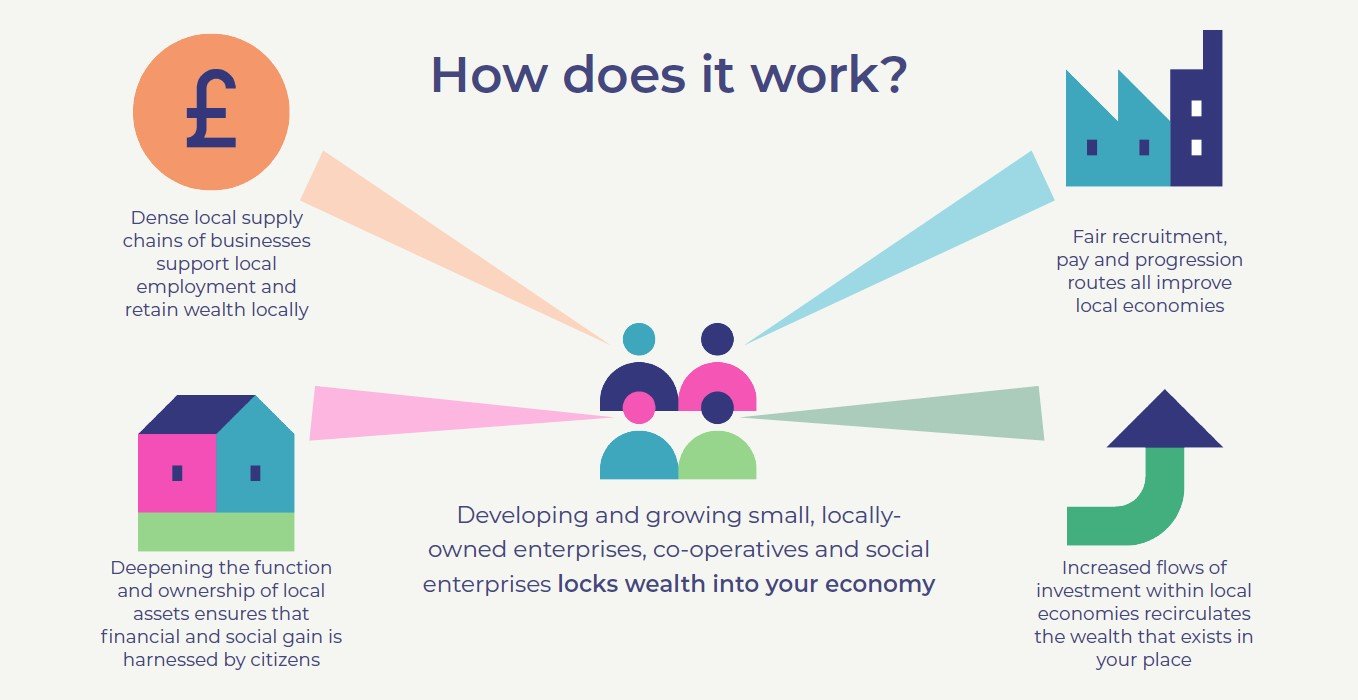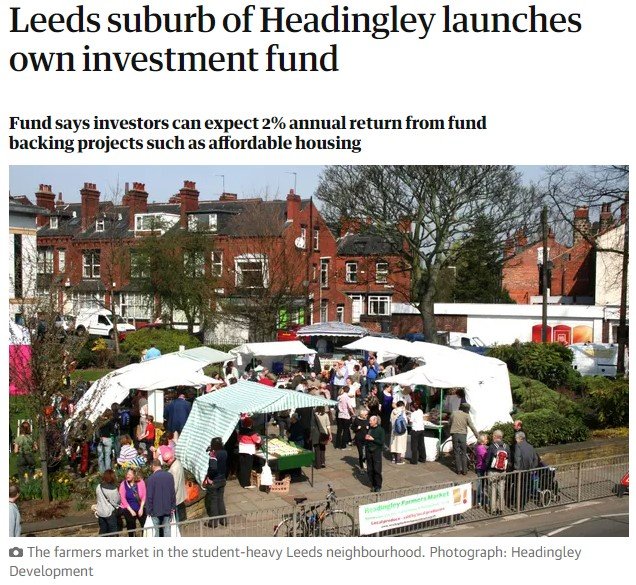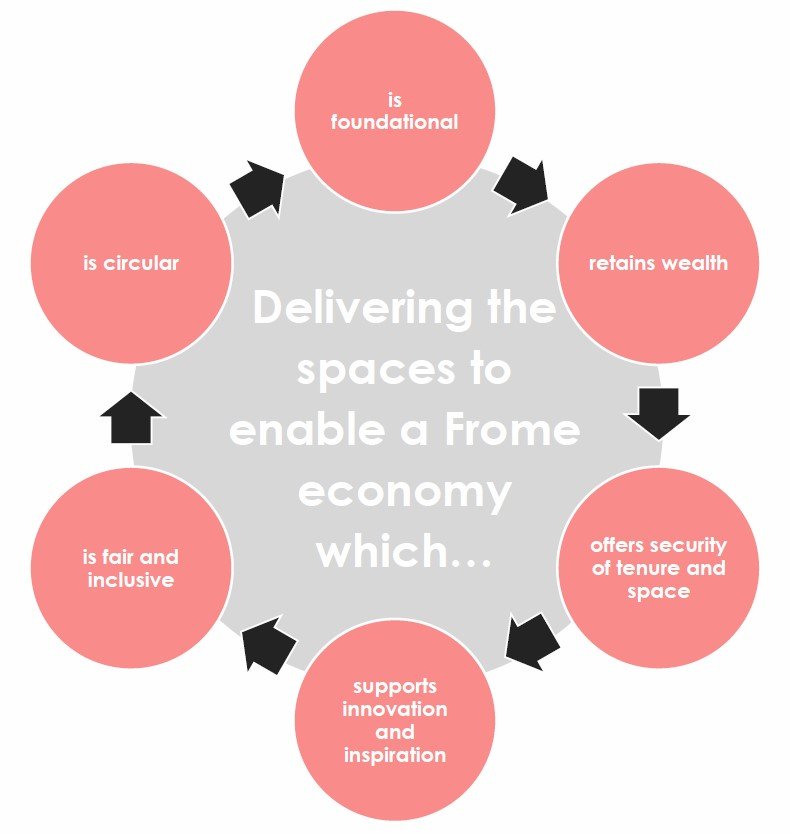What is community wealth building?
YoCo’s Community Plan for York Central responds to the extensive My York Central engagement with the local community, which emphasises a local economy which is based upon
Community wealth building
and
A community made through exchange
What do these terms mean, though, and how are these ideas connected? How might this version of York Central differ from other visions of commercial development on York Central?
Community wealth building:- Let’s turn to the Centre for Local Economic Strategies (CLES) – the national organisation for local economies, for a definition to get us started. They say it’s “an approach to economic development that changes the way that our economies function, retaining more wealth and opportunity for the benefit of local people”. So – it’s an economy that aims to give local people more economic benefit (wealth) and opportunity than would be normally the case. If a business operating in a place employs people from nearby, does business which spreads the benefits of transactions nearby, and where the control of the business (so decisions about who benefits) is held nearby, then that’s probably community wealth building. If ownership is close to local people so profits from activity or assets stay nearby, then that’s probably community wealth building.
Want to know more? Read of the huge number of case studies – in the UK and elsewhere – where different approaches to community wealth building have succeeded, and sign up for their regular blog. Read the New Economics Foundation report from 2002 Plugging the Leaks which spells out how to “make the most of every pound that enters your local economy”.
Are there any specific qualities of businesses which tend to encourage community wealth building? Let’s look at size:- Big businesses tend to become more remote from the communities they operate within, especially as they grow international or global ambitions. Finance for growth often comes from remote sources and control then goes with it. So small businesses often form a good foundation for community wealth building, and networks of small businesses are often more resilient when change or crisis comes along. But this doesn’t mean small ambitions – small businesses can be part of big networks, or be partners with big “anchor institutions”, or benefit from being part of overarching bodies bringing knowledge or funding. CLES describes the development of “dense local supply chains (which) support local employment and retain wealth locally”.
Want to know more? Collaborative networks embracing community ownership can get very large – read about Mondragon and its network of cooperatives across business, finance, retail and education sectors involving around 80,000 people, yet still keeping benefits and ownership local. The Co-Operatives UK Economy 2021 report spells out how small, local employee-owned businesses coped well with the economic hit of the pandemic.
Community wealth building can be powered by local investment and local ownership of assets. Headingley Development Trust was faced with a local economy which had ceased to respond to the needs of long-term citizens, so in 2018 they raised just under half a million pounds through a community share issue to provide a much-needed local shop and a regular farmer’s market along with investment in affordable homes. Investors get interest payments – it’s not just altruism.
Want to know more? Read about Headingley Investment Fund (and see how its bold plans were reported back in 2018). Visit their farmer’s market, bringing good local food to the community. See how People’s Property Portfolio are regenerating derelict buildings in Bradford to give local ownership and local benefits. See how crowdfunding kick-started the Luchtsingel bridge in Rotterdam, unlocking neglected urban space.
Community wealth building also focuses on fairness and social value. On our own doorstep, Spark incentivises social value in the businesses it hosts, by discounts on rent. The Economic Manifesto of the bold Mayday Saxonvale development project in Frome sets out the key role of “an economy which is fair and inclusive”. Such initiatives work best where everyone is playing by similar rules – where there is a network of businesses with shared values.
Want to know more? Read about Mayday Saxonvale’s challenge to Frome Town Council and their vision for a new part of the town which builds on its qualities. Read their Economic Manifesto to see how even a “place-based vision” is underpinned by economy.
A community made through exchange:- Small-scale businesses can operate within networks which bring knowledge and exchange of information. Part of the My York Central big idea of “a community made though exchange” was to create a local network which included the city’s two universities, York College and Explore (Libraries), and York Adult Learning, working with a community which included the universities’ graduate students and other entrepreneurs, local people developing small businesses, and other people of all ages who would bring resources of all sorts – from child-minding for busy young workers to accounting skills and oversight. A circular process which makes the most of community assets, and brings community knowledge and skills, wealth and fulfilment.
Want to know more? Read about how this sits among the My York Central Eight Big Ideas and Vision for York Central, and discussions which happened during the public engagement about how to build a community made through exchange, how community-led development can bring change, and exploring how a local hub for creativity might work.
How does this help create the vision in YoCo’s community plan?
The plan sets out a vision based on how life on York Central would be experienced – what do you see, hear, do there? The people of York wanted kids playing in the street, they wanted to hear birdsong in the city. They wanted space to do creative things with their fellow citizens – from growing food to simply sharing time. YoCo’s Community Plan went through a lengthy process of development where we asked what it took to create these good things. For kids to play in the streets we need to go further than removing traffic – we need to create streets full of activity, where people make short, easy journeys between the many things they need in their everyday lives; the widely-promoted “fifteen minute neighbourhood” increasingly brought to reality in Paris.
YoCo promotes community ownership as a tool to enable this holistic approach, bridging the gaps between homes, commerce, education and culture which fragment and disperse our urban lives, sending us reaching for the car to connect them. A high-density, mixed-use neighbourhood can both power and be powered by community wealth building:- the close connections which create opportunity work best when everyone who participates then benefits.
When the benefits of local innovation and collaboration don’t leak out to distant shareholders, compromise and cooperation comes easier – the places we make work better.





